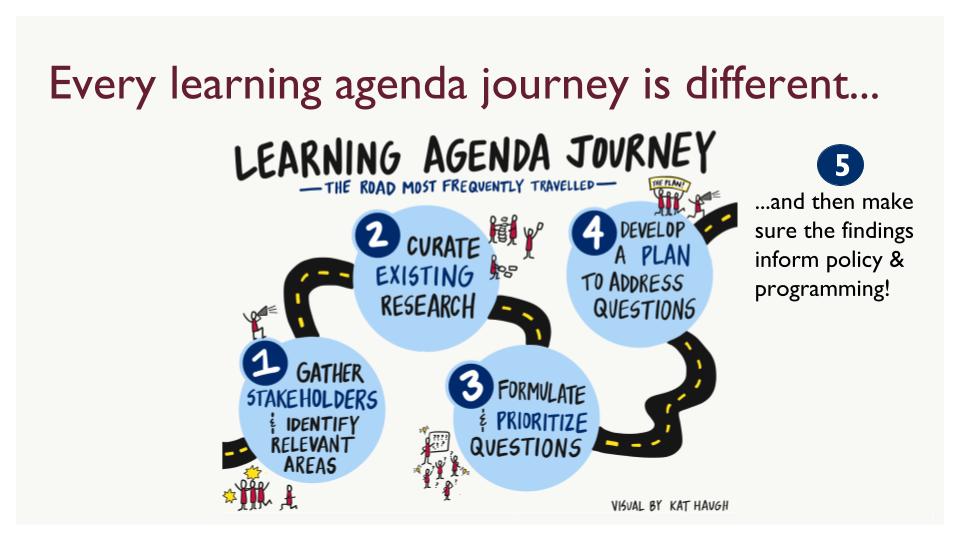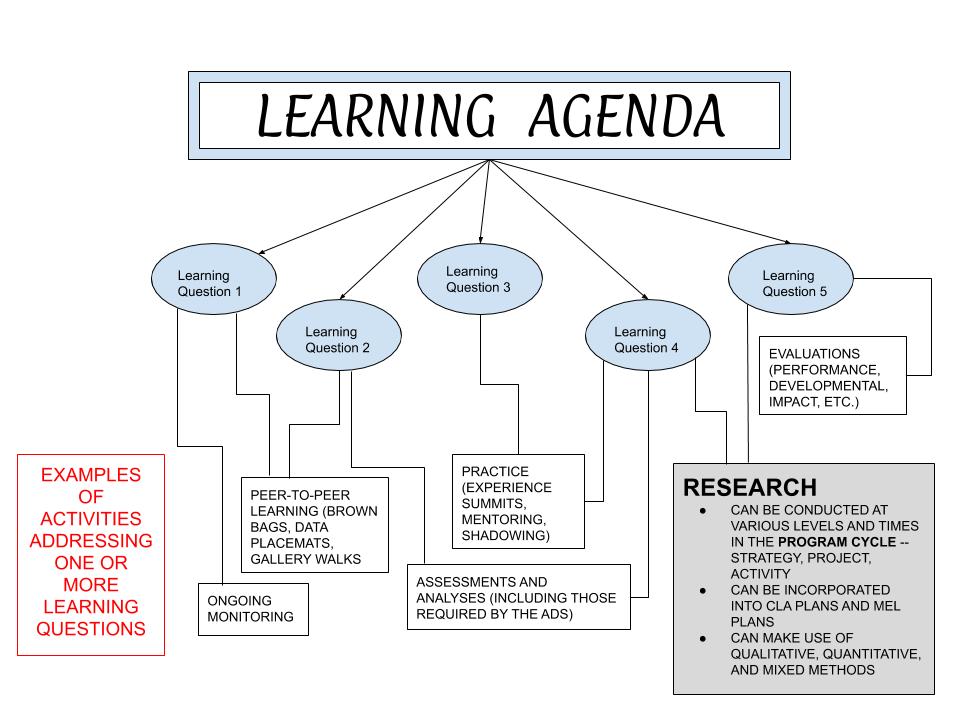Learning Agendas Across Federal Agencies
With the passage of the Evidence-Based Policymaking Act in January 2019, each federal agency is now required to have an agency-level “evidence-building plan” -- in other words, a learning agenda. “The head of each agency shall include in the strategic plan required under section 306 a systematic plan for identifying and addressing policy questions relevant to the programs, policies, and regulations of the agency,” the Act states.
Because USAID is among the first federal agencies to put an agency-wide learning agenda in place, the Office of Management and Budget (OMB) asked USAID to host a webinar on the topic, with a particular focus on the Self-Reliance Learning Agenda (SRLA). The webinar, entitled, “Developing USAID’s First Agency-wide Learning Agenda,” was held on July 16, 2019, and attracted 72 participants from 26 different federal agencies.
During the webinar, Stacey Young, Senior Learning Advisor and Team Lead of Collaborating, Learning, and Adapting (CLA) in the Office of Learning, Evaluation, and Research in the Bureau of Policy, Planning, and Learning (PPL/LER) at USAID, and Laura Ahearn, Senior Monitoring, Evaluation, Research, and Learning Specialist at Dexis/LEARN, discussed the process of developing the SRLA and shared how USAID leveraged lessons learned from a Learning Agenda Landscape Analysis, the Program Cycle Learning Agenda, and other recent learning efforts.
One of the main points of the webinar was that while every learning agenda’s creation process will differ, there are still some common steps that most take. In addition, there are several tips that were shared based on USAID’s experience:
- Start with the end (UTILIZATION) in mind. Build relevance and buy-in by engaging from the beginning with end users. One of the key lessons shared in the webinar -- a lesson that is supported by research and experience in the fields of knowledge management and organizational learning -- is that people are more likely to use evidence if they have had a role in shaping it.
- Build on existing learning efforts and try for some quick wins. It’s often possible to leverage existing learning activities for some short-term products. These can provide the learning agenda effort with valuable quick wins and can also lay the groundwork for longer-term results.
- Put together a dedicated team with diverse skill sets. A dedicated team with diverse skill sets (such as research, adult learning, project management, program design, human centered design, relationship management, technical expertise, etc.) is crucial to success. Also be prepared to restructure the team or the effort periodically as needs change.
- Don’t underestimate the staff, resources, and processes involved. Think carefully about the resources you will need not just to formulate questions for the learning agenda but also to implement it. Knowledge management in particular can be a challenge.
- Plan for regular Pause & Reflect sessions to review progress. Look for frequent opportunities to pause and reflect on what’s working, what’s not, and what to do as a result.

Figure 1. Steps in the process of creating a learning agenda.
In the process of creating a learning agenda, it is important to recognize that the learning activities planned to address the learning agenda’s questions can involve a lot more than traditional research. In the visual below, you’ll notice that the learning activities for this hypothetical learning agenda include not only some standard quantitative or qualitative research studies and evaluations but also some experiential activities and peer-to-peer learning in order to allow for quicker feedback loops. Sometimes the activities can address multiple questions, so it is also important to plan carefully in order to use resources efficiently.

Figure 2. Many different kinds of learning activities can generate evidence that addresses the questions in a learning agenda.
The webinar concluded by reminding participants that learning agendas are ultimately about behavior change. Helping people internalize and use the evidence is therefore just as important as the actual questions themselves, if not more so.
The webinar hosts shared several resources on learning agendas, including the following:
- The recording of the webinar, “Developing USAID’s First Agency-wide Learning Agenda” and the PowerPoint presentation used in the webinar
- OMB’s memo on Phase 1 implementation of the Evidence-Based Policymaking Act, “Learning Agendas, Personnel, and Planning Guidance”
- Landscape Analysis of Learning Agendas: USAID/Washington and Beyond
- Tips for Creating a Learning Agenda: Based on the Findings of a Landscape Analysis of Learning Agendas at USAID
- The Evidence-Based Policymaking Collaborative’s “Engaging Stakeholders in Learning Agenda Development: A Playbook for Federal Agencies”
- Tools and Resources for Learning Agendas, including for example, the following:
- Establishing a Learning Agenda -- Guidance and Template
- Learning Activities Grid
- Learning Questions Checklist
- USAID Learning Lab blog post: “Learning Agendas: The Five Most Important Things You Need to Know”
- Self-Reliance Learning Agenda Fact Sheet
Do you have tips for developing a learning agenda? Submit your feedback to [email protected].



